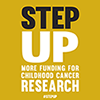Medical Considerations at School
Attending school is an important part of a child’s life. Going back to school after a diagnosis of children’s cancer is an important step in returning to a child’s normal routine. Although there are some inherent risks of infection and “catching something,” the benefits of attending school far outweigh the risks. Maintaining friendships and routine interactions with peers are essential to normal psychological development and are as, or more important than academic issues.
A child with cancer will have many physical changes that will be noticeable, including hair loss, decreased energy and an increased potential for bruising and nosebleeds. Some temporary changes include weight gain or loss, mood swings, facial fullness, problems with coordination, difficulties with fine and gross motor control, muscle weakness and body marks resembling tattoos, which identify sites of radiation.
Many children undergoing treatment for cancer may have fatigue, which they describe as feeling tired, weak or sad. The fatigue may be severe enough that the child needs a nap during school time or is only able to attend for half days. Often the child cannot fully participate in physical activities due to their fatigue, but they should be encouraged to do as much as they feel they can.








